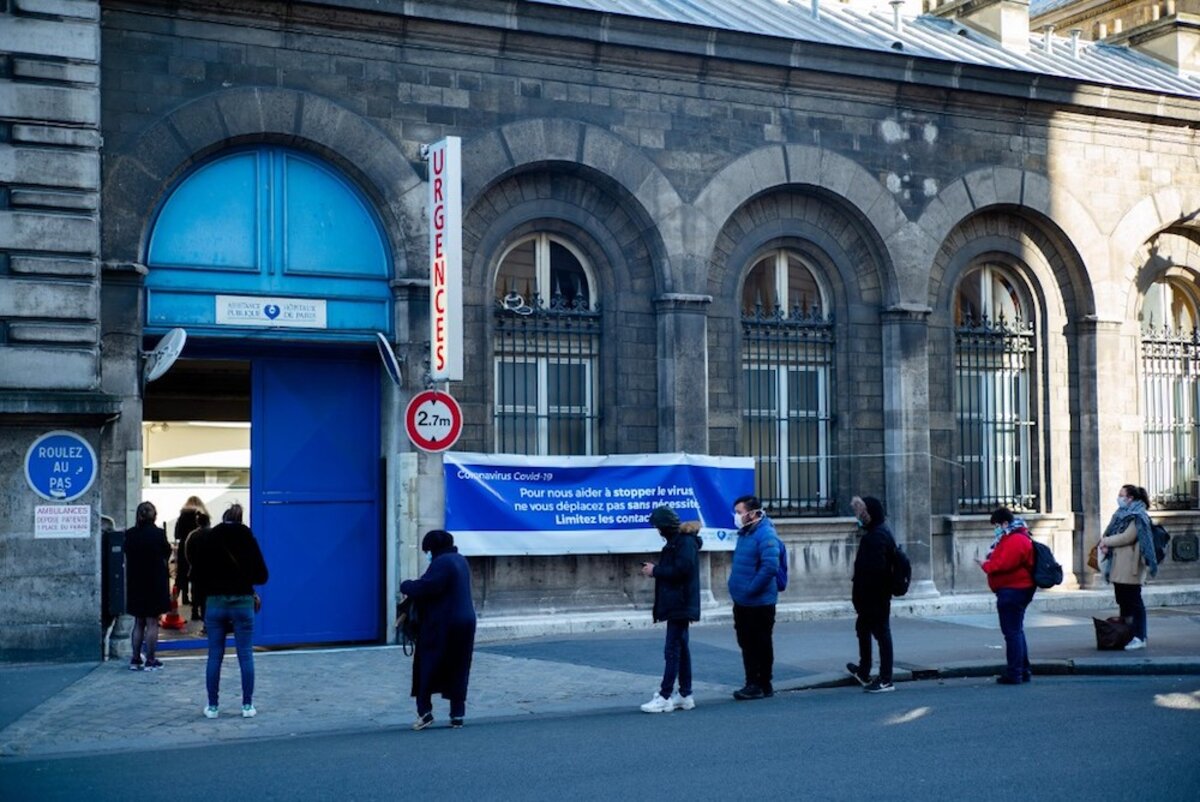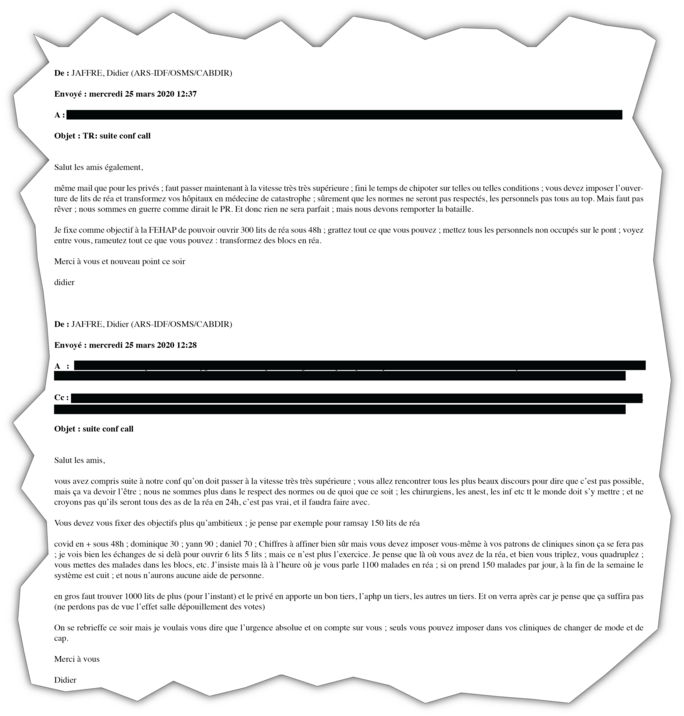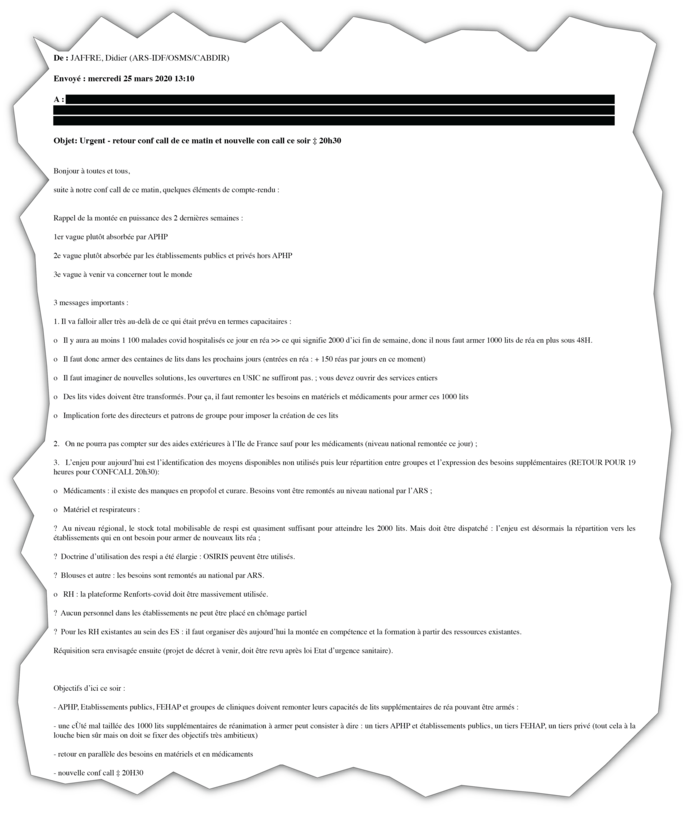Hospital intensive care medical staff in the Paris region are seeing deaths on a daily basis. Each day they are using medical criteria to decide whether patients with chronic symptoms should be admitted or not to the intensive care unit.
And this growing workload is starting to take its toll on staff. Ever since the start of the Covid-19 coronavirus outbreak Jean-Michel Constantin, an intensive care doctor at the Pitié-Salpêtrière hospital in Paris, has been unfailingly reassuring in his comments. But on Wednesday March 25th, for the first time, he admitted to having “anxieties” after a “hellish night”. He said: “I hope this is the wave [editor's note, of coronavirus cases] that everyone is talking about, and that it will soon subside. Because otherwise...”
“We are in Bergamo's situation in Italy,” said hepatologist Anne Gervais, referring to one of the European epicentres of the outbreak. “We are ten days behind, that's all. It's incredible, some doctors are still in denial,” said the specialist in the infections unit at the Bichat hospital in Paris whose only patients now are those suffering from Covid-19. The “strange” mood in her department reminds her of the late 1990s. “Those were the end of the AIDS days, I experienced them as a young doctor,” she said. “But everything is going faster today: in just 15 days we have toppled into a kind of cataclysm.”

Enlargement : Illustration 1

“We're continuing to free up intensive care beds but they're filled in the hours that follow,” said Jean-Michel Constantin on Wednesday. According to him the thousand-plus intensive care beds available around Paris were “90% full” and there were only around one hundred beds left in the region. Following on from the example of the virus hotspots of Mulhouse and Colmar in the north-east of the country, Assistance Publique-Hôpitaux Paris (AP-HP) – the biggest and most prestigious of the hospital groups in France – is now in a race against the clock against the coronavirus outbreak. “And it's catching us up,” said Jean-Michel Constantin.
At around 2pm on Wednesday March 25th Didier Jaffre, the director of healthcare at the Paris regional health authority or ARS, sent out a series of emails to the heads of all the hospital groups in the region, both public and private. These messages, seen by Mediapart, urge the hospitals to throw all their energies into this race against time. To the directors of private not-for-profit hospitals he wrote: “We now have to move to top, top speed. The time for haggling over this or that condition has gone. You must enforce the opening of intensive care beds and transform your hospitals into natural disaster facilities: sure, the normal rules won't be followed and the staff won't all be the best. But this isn't a dream, as the PR [editor's note, president of the Republic, Emmanuel Macron] would say, we are at war. So nothing will be perfect but we must win the battle.” A little later he wrote: “Get hold of everything you can and get all non-busy hands on deck.”

Enlargement : Illustration 2

In his email to the directors of private hospital groups, Didier Jaffre wrote: “Surgeons, anaesthetists, nurses etc, everyone must get get stuck in and let's not think that they will all be great in intensive care, that's not the case, but we have to get on with it.” Even more worryingly he added: “I think that this won't be enough (let's not lose sight of the vote counting effect).” This was a reference to the first round of the local elections which was held on March 15th and which, given the incubation period of the virus, could lead to an influx of patients in a critical conditions in the coming days.
In a more diplomatic email, shared with Martin Hirsch, director general of the AP-HP, Jean-Patrick Lajonchère, director of Saint-Joseph hospital, and Pascal Roché, director general of the Ramsay Générale private health group, Didier Jaffre set out to describe the current situation. Faced with more than “150 admissions to intensive care each day” the Paris region had to “arm itself with a thousand intensive care beds in 48 hours”, he wrote.
And unlike the Alsace region of north-east France, he warned that “we cannot count on outside help”, probably a reference to the fact that the Paris region already has the largest hospital capacity in this part of France. The number of ventilators is “almost enough”, they just needed to be shared out, he wrote. As for “medical gowns”, other equipment and “medicines”, Jaffre wrote that “demand has risen at a national level”. When it came to staff, he said he was counting on the online platform “Renforts-Covid” ('Covid Reinforcements') where 7,000 health professionals, including retirees and students, have already signed up to help out.
Didier Jaffre wrote that the “requisition” of staff will be looked at later, with plans for an official decree to come as part of the state's declaration of a health emergency. The AP-HP's Martin Hirsch said the same when he told France Info radio: “We need every team, all personnel, whether they are volunteers or we make use of an order,” making it clear the idea of ordering staff to work was being actively considered.
These emails, which call for a general mobilisation of hospital resources, were circulated quite widely. Wilfred Sammut, an intensive care doctor at Versailles near Paris and member of the AMUF trade union, was aware of them on Wednesday evening and was shocked. “The administration, from the ARS [editor's note, the health authority] to the ministry, has been slow to get going. It's unable to manage. As in China, as in Italy, this virus has turned into a monster. I want to weep.”

Enlargement : Illustration 3

Paramedics from the Collectif Inter-urgences (CIU), who a year ago started unprecedented industrial action in public hospitals, did not wait to be asked to get involved. “Everyone has come back, even those who had resigned,” said Yamina Kettal, a casualty ward nurse at Delafontaine hospital in Saint-Denis, north of Paris, and a member of the CIU. “In my department some former colleagues came in and helped of their own volition.” But by as early as Tuesday her hospital was showing “signs of major stresses. Intensive care is full, the epidemic is advancing faster than us,” she said. The nurse is worried about Seine-Saint-Denis – the département or county north of Paris which has some of the highest levels of poverty in the country – where people are “more vulnerable, with lots of cases of diabetes, high blood pressure and fewer hospitals. Will this vulnerability be taken into account in the resources that we are given? I doubt it,” said Yamina Kettal.
At the accident and emergency unit at the Tenon hospital in Paris, where “six out of eight cubicles are dedicated to Covid patients” a nursing assistant reported that “some colleagues are in the process of cracking mentally. You get the impression that more and more patients are being hospitalised, more and more young ones. We have a lot of student nurses, who are not even being paid, whom we are sending in to this carnage.”
The emotions expressed by medical professionals are partly explained by the number of them who have contracted Covid-19. At the AP-HP hospitals in the Paris region 490 had contracted it by March 23rd and 628 by the following day. As with the rest of the population these positive tests do not give the full picture of the epidemic's spread. “We're only tested when we have a temperature,” said the nursing assistant at Tenon hospital. And staff carry on working even when they have a cough. In the A&E department at the Delafontaine hospital in Saint-Denis “eleven nurses have tested positive out of 90” said Yasmina Kettal. “Some colleagues are vulnerable, we're worried. And we're also worried about our families. There is fear, this illness is causing us distress.”
In the Grand Est or Great East region of France five doctors have already died, as has a nurse at Montreuil in Seine-Saint-Denis. Among the AP-HP hospitals three members of staff are in intensive care. At Versailles the casualty doctor Wilfrid Sammut has a colleague who is in intensive care. “It was predictable, it is appalling. We're going into battle without weapons,” he said. “In my department we are allowed one new medical gown a day. We are counting them. Fortunately [car makers] Renault has sent us its stocks...”
The nursing assistant at Tenon hospital in Paris said that they had “just one medical gown for the whole night, very few [protective] glasses, we lack wipes for cleaning”. The nursing assistant added: “Fortunately we have received some hydroalcoholic solution. We can only use FFP2s [editor's note, protective masks] very sparingly, just for carrying out tests. You have to negotiate all the time, it's appalling.”
Back at the Delafontaine hospital in Saint-Denis, Yasmina Kettal told a similar story. “We're short of all protective equipment, it's chaos. Why haven't they provided more resources? Is it because we're at the end of the line?” she asked. “We want to be able to stop talking about these masks in the future! We have 2,300 staff at Delafontaine. Each week we receive exactly 11,650 surgical masks and 3,550 FFP2 masks, and half of them are out of date and the packages are damaged. When I think that we started our protest in the A&E units a year ago and that we have got almost nothing ...there will be some accounts to settle.”
Hepatologist Anne Gervais, who works at the infections unit at Bichat hospital in Paris which is full of Covid patients who are “coughing and spitting”, said she was surprised not to have received medical gowns and FFP2 masks “even though the rest of the planet has them. We have a clear shortage compared to the rest of the world. It's staggering.”
Speaking on France Info on Wednesday March 25th, Martin Hirsch, director general of the AP-HP, was moved by the plight of nurses. “We have to have guarantees that their [situation] will be acknowledged,” he said. “We can't be stingy with them, we have to maintain the troops' morale, they need that.”
The Collectif Inter-urgences (CIU) meanwhile said that it was astonished that in the huge 45-billion-euro plan produced by the government to tackle the coronavirus crisis just two billion euros have been allocated to the health sector to “buy equipment, masks and to cover sick leave”. Anne Gervais, herself a member of the CIU, said: “They haven't understood a thing, we are a long way from the target. We need one nurse per six to eight sick people, not fourteen, and not just for Covid but for the rest of the time. Their salaries must go up by 20%. The way hospitals are run must change. And we must stop pricing according to [medical and health] activities,” she added, referring to an internal pricing system introduced in the French health system in 2007.
Visiting one of the epidemic's hotspots, Mulhouse in the north-east of France, on Wednesday March 25th, President Emmanuel Macron promised a “massive plan of investment and review of all [hospital] careers”. He insisted: “This response will be deep and lasting.”
Meanwhile the country's director general of health, Jérôme Salomon, who gives daily bulletins on the epidemic, also paid tribute on Wednesday to the nurses who “battle without a break, they deserve all our admiration and tributes. We will have individual tragedies, we will have collective tragedies, with many grieving families. We must stand together in the face of an unprecedented and very critical situation,” he added. Hospital staff are ready – for now, at least.
-------------------------
If you have information of public interest you would like to pass on to Mediapart for investigation you can contact us at this email address: enquete@mediapart.fr. If you wish to send us documents for our scrutiny via our highly secure platform please go to https://www.frenchleaks.fr/ which is presented in both English and French.
-------------------------
- The French version of this article can be found here.
English version by Michael Streeter


